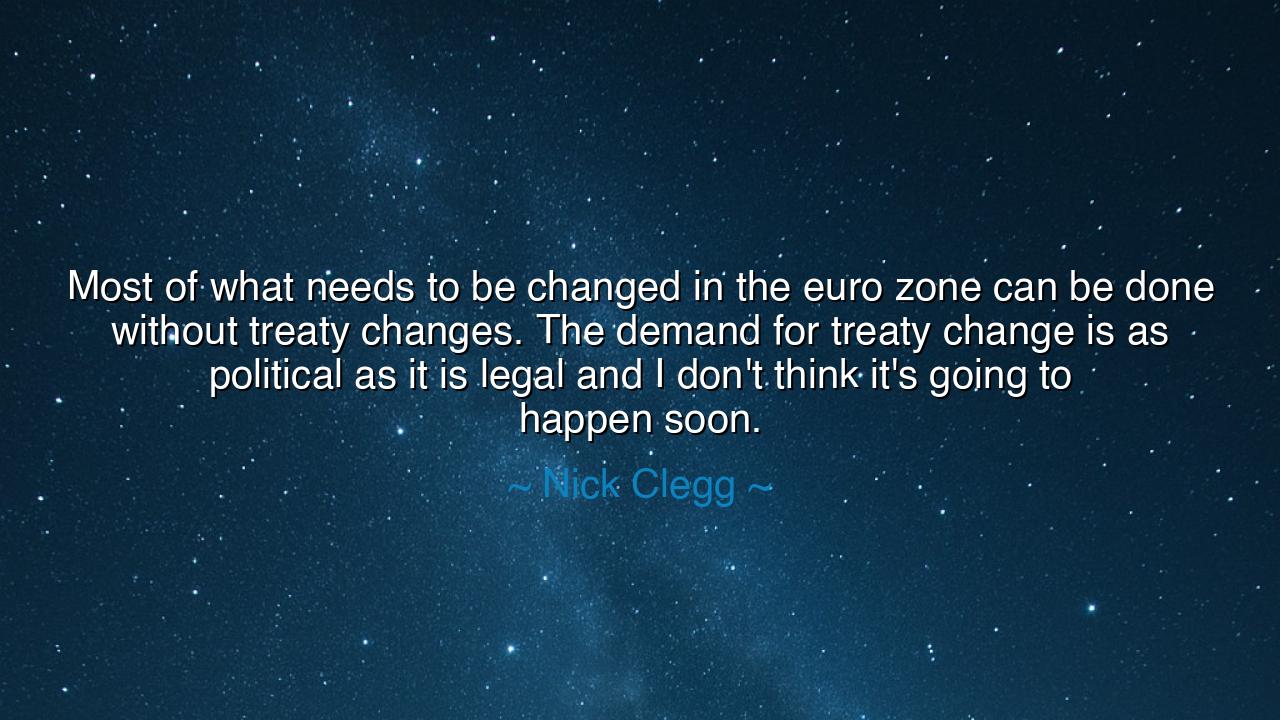
Most of what needs to be changed in the euro zone can be done
Most of what needs to be changed in the euro zone can be done without treaty changes. The demand for treaty change is as political as it is legal and I don't think it's going to happen soon.






There are words that carry not thunder, but the calm foresight of one who has seen the storms of power and the frailty of empires. When Nick Clegg said, “Most of what needs to be changed in the euro zone can be done without treaty changes. The demand for treaty change is as political as it is legal and I don't think it's going to happen soon,” he was speaking not only as a politician, but as a student of human governance. His words are an acknowledgment of an eternal truth: that in the realm of nations, law and politics are entwined like twin vines, and where law seeks permanence, politics seeks advantage. Clegg’s insight reminds us that systems of union, however noble, are made not of marble, but of men — and thus, their greatest struggles are not with statutes, but with ambition.
The origin of this quote lies in the turbulent years following the Eurozone crisis, when Europe stood on the edge of fragmentation. Debt, austerity, and distrust had shaken the very foundations of the European project. Voices arose demanding that the treaties which bound the nations together — the sacred documents of unity — be rewritten, reshaped, or cast aside. Yet Clegg, then a British statesman and advocate of European cooperation, perceived that this call for treaty change was not born solely from necessity, but from political theater. Many sought not reform, but leverage — not unity, but influence. His words, therefore, are not cynical but wise: a recognition that sometimes the cry for legal change masks the deeper desire for power.
Clegg’s statement carries a lesson older than the European Union itself. The ancients knew that the letter of law may remain still, even as its spirit evolves. The Roman Republic, for centuries, endured not through constant rewriting of its constitution, but through adaptation — the magistrates, the Senate, the tribunes of the people all learning to stretch the law’s meaning to fit the needs of their time. It was only when the balance between law and ambition broke that Rome fell into tyranny. In the same way, Clegg warns that Europe need not tear apart its treaties to grow stronger; it must instead act within them with renewed purpose, bending without breaking, reforming without destroying. For true reform does not always demand new parchment — only new courage.
When he says that the demand for treaty change is as political as it is legal, Clegg unmasks the hidden motives that often drive reform. Every age has known leaders who call for great change not for the good of the many, but for the gain of the few. In the court of King Henry VIII, the law itself was rewritten to justify his will; in the congresses of postwar Europe, treaties were negotiated with words of unity but hearts of rivalry. The wise see through this. They understand that the machinery of law is often the stage upon which political actors perform their dramas — some noble, some deceitful. Thus, Clegg’s calm declaration is not an evasion of reform, but a defense of stability against the storms of opportunism.
There is also in his words a note of humility — a recognition of time’s rhythm in political change. “I don’t think it’s going to happen soon,” he admits, and in that restraint lies wisdom. The impatient man demands transformation by decree; the statesman knows that institutions, like trees, must be pruned slowly lest they die. The Eurozone, with its many nations, tongues, and histories, cannot be remade in haste. It must be tended with patience, compromise, and dialogue — virtues that the ancients called the pillars of peace. To change its treaties recklessly would be to unweave the tapestry that took generations to weave.
History offers many examples of this truth. When the Founding Fathers of America crafted their Constitution, they built into it the power to amend, but not the impulse to do so lightly. They knew that too many changes would dissolve the unity they sought to preserve. The same principle governs Clegg’s reflection on Europe: that the strength of a union lies not in rewriting its foundations, but in deepening its fidelity to them. Treaties, like covenants, hold their power not by perfection, but by persistence. Their endurance is the measure of civilization’s maturity.
So let this be the lesson handed down from Nick Clegg’s words to those who govern in every age: seek not always to rewrite, but to renew. The laws of men, like the bonds between nations, grow not by constant change, but by wise stewardship. Reform without understanding breeds ruin; patience guided by principle builds endurance. The Eurozone, and indeed all unions of humankind, must remember this: that the truest change is not born of politics or paper, but of integrity — the resolve to act justly within the laws already given. For when leaders learn to strengthen the spirit of their institutions rather than rewrite their form, they do what is hardest and most divine — they teach the art of endurance to the fragile heart of man.






AAdministratorAdministrator
Welcome, honored guests. Please leave a comment, we will respond soon